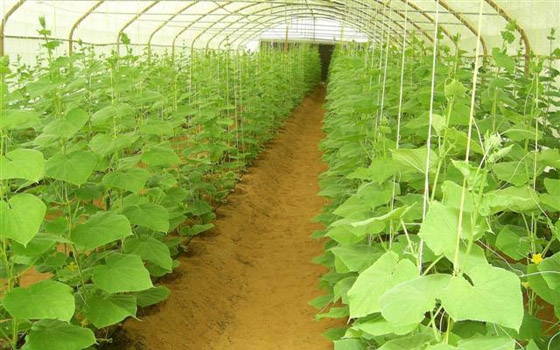Efforts to raise the profile of farmers and their produce in Abu Dhabi are gathering strength as the emirate steps up its bid to generate greater food production. Addressing the challenges stemming from the UAE’s arid climate and limited water supply forms a key component of the emirate’s agriculture drive and is expected to facilitate Abu Dhabi’s plans to roll out extensive development projects in the coming years.
The emirate has begun growing vegetables and plants using methods that require less water, according to the Abu Dhabi Food Control Authority (ADFCA). It has also stepped up conservation efforts, recycling irrigation water and using it more effectively, while taking steps to prevent leaks and evaporation.
“In addition to these, we are conducting several programs to create and strengthen awareness among farmers and farm owners about how the right use of technology can contribute to higher productivity, higher incomes from farming and reduced time spent on cultivation,” Rashed Mohamed Al Shariqi, the director-general of ADFCA, told OBG.
At present, water used for agriculture and afforestation accounts for 76% of Abu Dhabi’s total consumption, according to ADFCA. Some 48% of the emirate’s water goes towards farm irrigation, while 23% is channeled into afforestation. Around 5% is used in gardens and parks. The demand for water is expected to increase by 123% by 2030 as Abu Dhabi pushes ahead with its development plans.
Al Shariqi told OBG that the agency was working with the Abu Dhabi Farmers’ Services Centre (ADFSC), a country-wide education resource for farmers, to boost productivity by using farming areas more efficiently. “In 2010-11, for example, intensive methods produced high-quality potatoes which were cultivated in the Western Region,” he said.
Farmers who took part in the program saw their potato crops more than double, rising to 44,000 vegetables per hectare (ha) up from 20,000, with productivity per ha increasing from 10-15 tons of potatoes to 38 tons. The volume of water required to grow a kilo of potatoes dropped to 154 liters, down from 640, through the use of efficient irrigation methods.
A recent study showing that 13% of soil in the UAE is suitable for irrigated farming should bolster the emirates’ efforts to expand the agricultural industry and promote local produce, particularly in Abu Dhabi, which was found to hold more than 5% of the country’s potential agricultural land. The findings of the two-year soil study, revealed in December, are expected to help the UAE attract new investment for agricultural initiatives and address problems caused by degradation of land and natural resources.
The emirate’s bid to build a better local network of food production has also raised awareness among consumers about both food security and safety. In its campaigns, the ADFSC has highlighted the benefits of buying local meat and animal foodstuffs from a traceable source, pointing out that reducing the number of stages involved in handling produce helped lower the risk of food-borne diseases.
Industry players acknowledge, however, that consumers will be looking for produce that holds its own against international foodstuffs. “The community wants local products,” said Chris Hirst, the CEO of ADFSC, told regional media. “However, shoppers aren’t going to buy vegetables or meat just because they’re local. They have to be as good, or better, than the imported [items].”
Efforts to boost production have also led to local companies investing in farmland abroad to ensure the emirates are supplied with essential foodstuffs. The UAE-based firm Al Dahra Agriculture, which is the biggest supplier of hay, rice and other essential commodities to the emirates, has channeled funds into various investments aimed at cultivating agricultural lands for long-term food security. The company announced in January that it would become the majority shareholder in eight Serbian farming corporations that own some 14,000 ha of farmland.
“By investing in acquiring and developing agricultural lands outside the emirates, the UAE can alleviate the pressure on water security and contribute to executing the nation’s vision for food security. At the same time, we are creating a stable and consistent supply of human food and animal feed by integrating the supply chain and retaining control of all aspects of the production-supply process,” Khadim Al Darei, the vice-chairman of Al Dahra Agriculture, told OBG.
Projects aimed at boosting local produce alongside increased demand from consumers have also highlighted the scope for expansion in Abu Dhabi’s agricultural industry. The new soil findings should strengthen the emirate’s hopes of attracting investors for a broad range of planning and development initiatives across the sector.
Oxford Business Group
14 February

























































